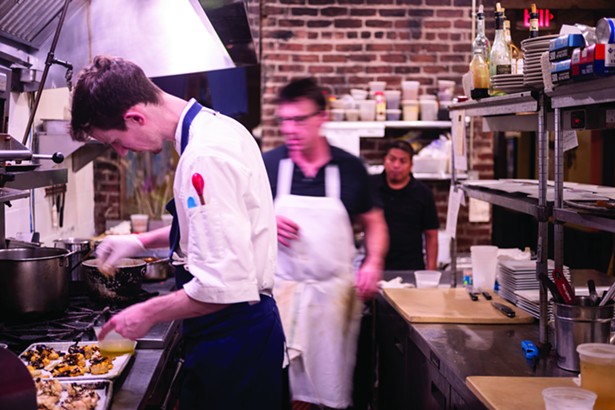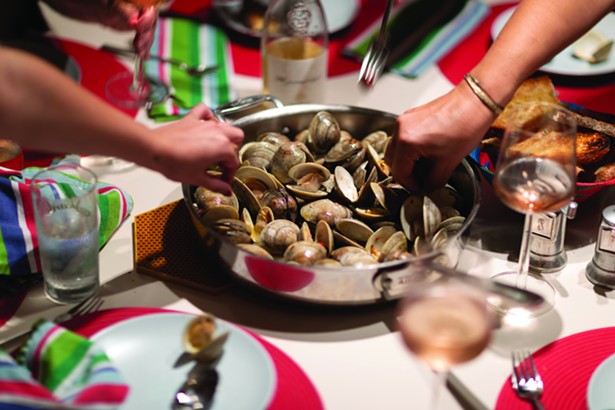Barn dinners, kitchen takeovers, pop-up events, seasonal restaurants—temporary food events come in many shapes and sizes with just as many monikers, but there is no denying the sharp increase in these ephemeral culinary experiences over the past few years.
"From a chef's perspective, when you own a restaurant, it's really difficult to step things up and evolve," says Rei Peraza, former chef/owner of Panzur in Tivoli. "Pop-up dinners allow you to be creative and have fun. They are, in essence, catered events that you are calling shots on—and maybe also an opportunity to manipulate or infiltrate the market."
In the Hudson Valley, many of the pop-up pioneers are familiar faces—iconic local chefs, like Peraza, who've shuttered their brick-and-mortar restaurants. "New World Home Cooking had reached a plateau," chef Ric Orlando says. "With all the new places that had opened, we decided that we had done all that we could do, and I wasn't making a ton of money."
Since closing the restaurant in April, Orlando has made multiple guest appearances on the culinary scene from a one-night buffet at Stockade Tavern to a sit-down tasting menu with wine pairings at event venue 7 Miles to Kingston. Pop-ups events emerged as a way to stay connected with his loyal customer base and make some cash on the side.
But they are also spreading the wealth. "The Hudson Valley is an interesting market," he says. "From Mother's Day till the last leaf falls, there are lots of people around, but after that, it becomes a dog-eat-dog market. Everyone is trying to create different forms of energy to draw people in."
Orlando has been approached by a handful of local restaurants hoping to have him do a kitchen takeover this winter. "In some way, shape, or form, we have to get residents to get out of their houses to support restaurants during the colder months," Peraza says emphatically. "Otherwise restaurants just stay open trying to hemorrhage as little cash as possible." Pop-ups can provide a welcome financial boost to both parties.
But pop-up dinners are not necessarily cash cows. After Orlando worked a food booth at the Empire State Record Fair in the back of BSP Kingston in July, his wife figured that between prep time and onsite time, he had netted $9 an hour. "I'm not going to get rich doing it around here," he says. "But it is fun. And a little money in the pocket doesn't hurt."
For Orlando, it's about the quality of life that he gets from not owning a restaurant. "As a chef or an owner, when it's busy, you have to be hands-on. And when it slows down, you have to be hands-on, because you can't afford to pay people," he says. "This is the first time in 20 years that I'm not going to bed every Thursday or Friday night with spreadsheets dancing in my dreams."
That said, Orlando has been anything but idle—a podcast, a cookbook, a memoir, a documentary film series, a culinary tour series, and a line of CBD hot sauces are just some of the spinning plates. "I'm in my fifties now, and my time is best-spent working on the projects that I've been incubating in my brain," he says.
The Snowbird Model
From June through October, a handful of New York City's culinary elite set up shop in the Quarter Moon Café in Delhi for a hyperlocal seasonal restaurant. A collaboration between Bovina native Carver Farrell (former owner operator of The Pines and Willow), Joe Aponte, Stephanie Hirsch, and Katie Phelan, Goldenrod was an innovative vegetable-forward restaurant open for dinner Thursdays through Sundays."I think the temporariness of pop-ups is a pretty big draw, but I never really liked that aspect," Aponte says. "It's just like, 'Here it is. Then, poof! Done. It just vanishes." A seasonal restaurant offered the perfect solution—a culinary destination that offered consistency to its customers and creative freedom to its proprietors, without the ball-and-chain of a year-round restaurant.
With the season over, Aponte and Hirsch (spouses) will head back to their homebase in Los Angeles. After winter, he and Farrell will look for a new spot upstate to host their concept. "I was really fortunate at young age to work at a couple kitchen jobs that had an amazing schedule," Aponte says. "I got a taste for having a life and not working a 65-hour week. Now, I want to make my own schedule. When I'm in California, I want to sit on beach, go play golf, and smoke a cigar...Unless I open a full service restaurant."












